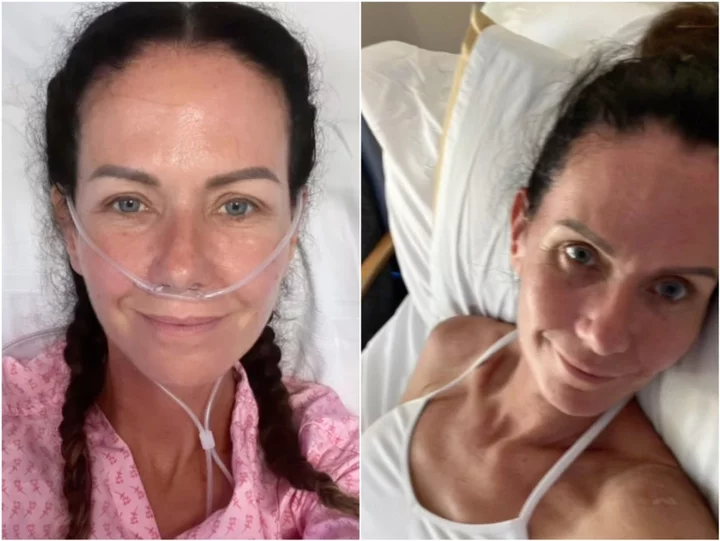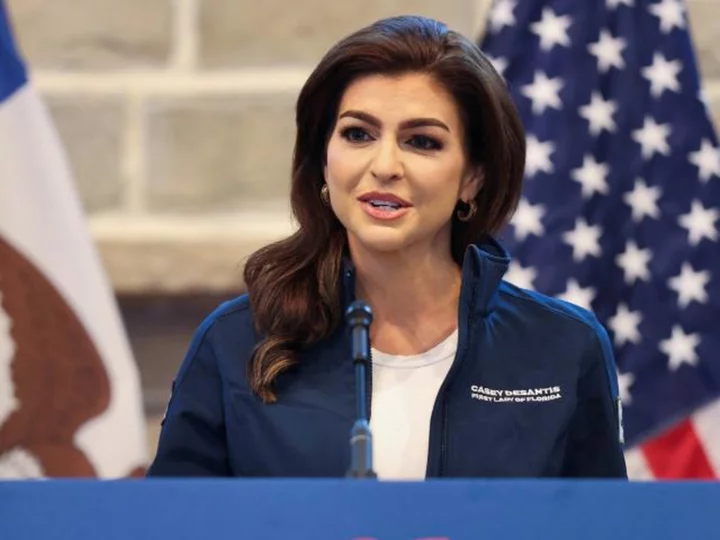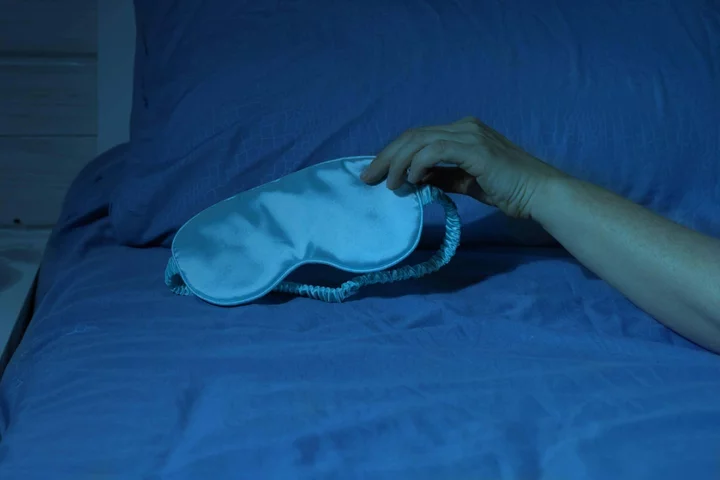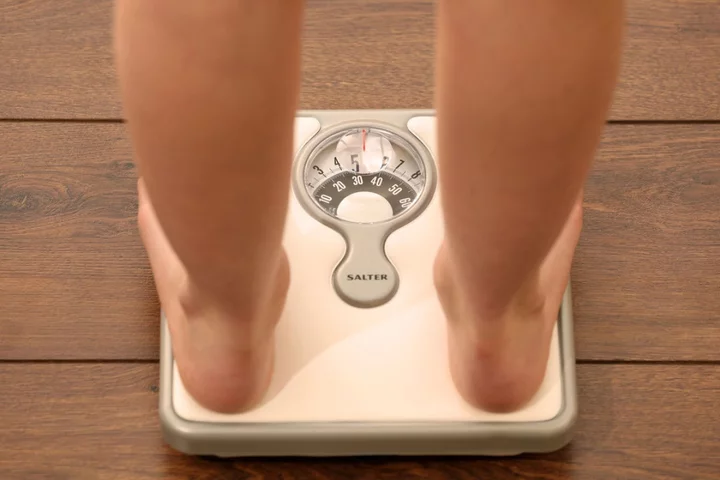
Emilia Clarke’s brain haemorrhage ‘profoundly changed our lives’, says star’s mother
Emilia Clarke’s mother has described how her daughter’s brain haemorrhage changed the Clarke family “in an instant”. Emilia, who played Daenerys Targaryen on Game Of Thrones, and her mother set up a brain injury charity after the star survived two life-threatening brain conditions while she was filming the hit TV show. Jenny Clarke said it feels like her daughter’s brain haemorrhage – a bleed on the brain – “feels like yesterday” even though it was more than a decade ago. The incident, which took place when Emilia was working out in a north London gym in 2011, was “completely out of the blue”, Jenny said. She said her daughter fought to stay conscious even though she was in “the worst pain she could ever imagine”. Emilia, now aged 36, was taken to a hospital in London but medics did not immediately spot that she had suffered a brain haemorrhage and it took “a long time” before she was sent to a specialist hospital where she received life-saving care, Jenny told the PA news agency. Jenny said there needs to be more awareness among medics about brain haemorrhages in young people because the condition is traditionally seen as something that happens to older people. Emilia also had to have a second procedure in 2013 where surgeons in New York had to remove a brain aneurysm which was found through routine check-ups. The Me Before You star and her mother have since set up the charity SameYou which is working to develop better recovery treatment for survivors of brain injury and stroke. Jenny, who is chief executive of the charity, said that rehabilitation after brain injury is “undervalued and under-prioritised” and should be a “key component of universal health coverage”. She said that while people with serious side effects of brain injury – such as mobility or speech and language problems – do get support, there is often little or no help for people who suffer mild to moderate problems. Jenny told PA: “It feels like yesterday to us really, because it was just such a profound shock. “She had just started Game Of Thrones, the first season had been filmed and she had just come back from a press tour. “And then she had her first brain haemorrhage which was completely out of the blue – it was a morning in March and she was in the gym and she suddenly felt this terrible pain in her head – she’s been quoted as saying it was the worst pain she could ever imagine. “She also realised that something was seriously wrong with her because the pain was so intense. “So she did her best, as she was lying semi-unconscious on the floor of the gym, to try and make sure she kept a sense of what was around her and she fought to make sure that she didn’t lose consciousness.” Jenny added: “When she was rushed to a hospital in London, it was very difficult to establish what has happened to her – and that’s also something that we think is very important; maybe there isn’t enough specialist information and training to actually recognise what happens when you have a brain haemorrhage when you’re young. “People expect people to have strokes and brain haemorrhages when they’re older, it’s a problem of older age, but Emilia was 23 when she had her first brain haemorrhage, so people didn’t recognise it as a brain haemorrhage. “So it took a long time before she was admitted to the wonderful Queen Square (the National Hospital for Neurology and Neurosurgery), which is part of University College London Hospitals and literally her life was saved because of an intervention to stop the bleeding. “But it was three weeks in hospital before we knew whether she was going to have another stroke, and whether she would have different health problems as a result of the brain haemorrhage.” Jenny continued: “When it comes completely out of the blue, your life is just changed in an instant. And I must say that our lives have been continuously changed because of it.” After describing the second “open head surgery” in the US, Jenny said: “Those two great big shocks really have profoundly changed all of us as a family.” The comments come as Jenny attended the launch of the World Health Organisation’s (WHO) Rehabilitation Alliance in Geneva – a coalition which is calling on countries to do more for people in need of rehabilitation services. Jenny delivered a speech to the WHO about the power of advocacy, saying: “There is huge power if survivors come together with one voice to demand that integrated rehabilitation is moved up the agenda. “One in three people will experience a brain injury. They are the most powerful advocates – and this meeting is calling for their needs to be heard and action to be taken.” On rehabilitation for brain injury survivors, she told PA: “As a young person… when something like this happens, you absolutely must have as much support as possible and it just doesn’t really exist. “If you have severe consequences of brain injury, of course, there are many places helping people if you’ve got strong long-term, serious conditions, but what we found was, is that you can have mild to moderate brain injury – and that means you don’t have any necessarily physical issues; you don’t have necessarily any speech and language difficulties, but you do always have the trauma that you’ve had the problem – and there is a just a huge lack of awareness that this is important enough to put resources to get it treated.” She added: “Rehabilitation is undervalued and under-prioritised and that’s clearly got to change as a key component of universal health coverage. “It was such a shock when it happened to us, when Emilia had her brain injury. “We’ve had thousands of people write to us, and so it’s not just our own lived experience, there’s just not enough provision, not enough services available. “There is a great unmet need and a gap in service provision after you’ve survived a brain injury, and you’re trying to rebuild your life, particularly if you’re a young adult. “And what we are advocating for is there needs to be a lot more information given to survivors of brain injury, about what’s happened to them and their opportunity to get recovery services. “There is a gap between what survivors and their families say they need and want and what is currently available in many developed countries.” Read More It took until my thirties to realise I might not be white Carrie Johnson announces birth of third child with Boris Johnson: ‘Guess which name my husband chose’ Buckingham Palace responds to Joe Biden’s ‘protocol breach’ with King Charles Charity boss speaks out over ‘traumatic’ encounter with royal aide Ukraine war’s heaviest fight rages in east - follow live
2023-07-11 22:21

Ben Cohen’s ex-wife Abby says she had only ‘one symptom’ before cancer diagnosis
Ben Cohen’s ex-wife Abby has been diagnosed with cancer. The professional photographer, 44, who shares two children with Cohen, shared a video to her Instagram account documenting her experience with cancer, describing it as the “toughest yet”. In the video, Abby is seen walking into a hospital before undergoing different tests. Several clips show her in a hospital bed, wearing a stoma bag while she is surrounded by her loved ones. Writing on Instagram, Abby recalled that she visited a doctor after having experienced only one symptom. She did not specify where the cancer had been found. “This was and is the toughest yet. I’m unlucky, but lucky, to have been warned only once with a symptom of this terrible illness,” wrote Abby in the post’s caption. She thanked the NHS for “saving” her “life” and taking care of her when she was so “scared and most vulnerable”. The photographer urged her followers to “never ignore” their bodies when warning signs present themselves. “I didn’t [ignore them] and it’s given me a chance to live my new life. In time and with the right treatment, I’m hoping this WILL all be a distant memory for me,” she said. Abby and Ben share twin 15-year-old daughters, Harriette and Isabelle. In the video, the children are seen supporting their mother during her time in hospital. Their father Ben, who is a former England Rugby player, and Abby were married for 11 years before they split in 2014. Cohen went on to start a relationship with his Strictly Come Dancing partner Kristina Rihanoff, whom he was partnered up with during his appearance on the show in 2013. Ben and Kristina welcomed a daughter, Mila, in 2016. The photographer went public with her new partner, David, in 2020. Speaking to MailOnline previously, Abby said that she did not want to be known for her past relationship. “I thought, ‘Everyone still labels me Ben’s ex’ but I’m not that Abby any more. I’m me. I’ve got my two girls. My life. I’ve finally met a really nice man. I want to be known as ‘Abby the good photographer’ or ‘Abby the great mum’. I’m very different. I’m stronger,” she said. Abby has continued to praise Ben as a “fantastic hands-on father”. Read More Woman shares co-worker’s ‘infuriating’ response to her decision to not have children Buckingham Palace responds to Joe Biden’s ‘protocol breach’ with King Charles 5 late summer blooms to plant now Maria Menounos says her tumour ‘doubled’ after first cancer symptoms were overlooked How to check if you have skin cancer: Symptoms and signs to look out Jonnie Irwin makes rare red carpet appearance as he says ‘every day is a gift’
2023-07-11 17:22

Jenin: Palestinian boy killed during Israeli assault was unarmed - family
It comes after videos emerge of the moment the 16-year-old was killed during an Israeli assault.
2023-07-11 07:15

Marine taken into custody after missing 14-year-old girl found at Camp Pendleton, authorities say
A United States Marine has been taken into custody for questioning after a 14-year-old girl who was reported missing was found at Marine Corps Base Camp Pendleton in San Diego County, California, last month, authorities said.
2023-07-10 03:49

Why Trump's Republican rivals should focus on New Hampshire, not Iowa
Donald Trump continues to be the clear favorite to win the 2024 Republican presidential nomination.
2023-07-10 00:58

14 promises Donald Trump has made in his campaign for a second term
Former President Donald Trump has hit the 2024 campaign trail and is giving voters a preview of what a second Trump presidency could look like if he's elected. He's made many campaign promises -- many of which are often vague and lacking in details or specifics -- including ending the war in Ukraine, building 10 new cities and giving drug smugglers the death penalty.
2023-07-08 18:24

Casey DeSantis charms Iowa Republicans at first solo campaign trail event
In a packed barn of more than 100 attendees, Florida first lady Casey DeSantis had the crowd laughing as she recalled bringing her 5-year-old daughter with her to an event last year.
2023-07-08 10:46

Middle-aged people who skip on sleep won’t see cognitive benefits of exercise
Middle-aged people not getting enough sleep are less likely to see the benefits of exercise when comes to protecting against decline in skills such as memory and thinking, scientists have said. Researchers from University College London (UCL) found that those in their 50s and 60s who performed regular physical activities but slept less than six hours a night had a faster decline in these skills overall. The team found that after a decade, their cognitive functions – such as attention, memory and learning – were the same as those who did less physical activity. The researchers said their study, published in journal The Lancet Healthy Longevity, highlights the need for sleep to protect against cognitive decline as people get older. Lead author Dr Mikaela Bloomberg, of UCL Institute of Epidemiology & Health Care, said: “Our study suggests that getting sufficient sleep may be required for us to get the full cognitive benefits of physical activity. “It shows how important it is to consider sleep and physical activity together when thinking about cognitive health. “Previous studies examining how sleep and physical activity might combine to affect cognitive function have primarily been cross-sectional – only focusing on a snapshot in time – and we were surprised that regular physical activity may not always be sufficient to counter the long-term effects of lack of sleep on cognitive health.” The World Health Organisation already identifies physical activity as a way to maintain cognitive function, but interventions should also consider sleep habits to maximise long-term benefits for cognitive health Prof Andrew Steptoe For the study, the team looked at data from the English Longitudinal Study of Ageing (Elsa) from nearly 9,000 people aged 50 and over. Their cognitive function was assessed over a period of 10 years with various memory and verbal fluency tests. Questionnaires were also used to assess how long they slept and whether this was less or more than six hours. People were also asked about their levels of physical activity. At the start of the study, those who were more physically active also had better cognitive function regardless of how long they slept. However, this changed over the 10-year period, with more physically active short sleepers in their 50s and 60s experiencing more rapid cognitive decline, the researchers said. But for people aged 70 and over, the benefits of exercise on cognitive function were maintained, despite short sleep, the team added. Co-author professor Andrew Steptoe, of UCL Institute of Epidemiology & Health Care, said: “It is important to identify the factors that can protect cognitive function in middle and later life as they can serve to prolong our cognitively healthy years and, for some people, delay a dementia diagnosis. “The World Health Organisation already identifies physical activity as a way to maintain cognitive function, but interventions should also consider sleep habits to maximise long-term benefits for cognitive health.” Read More 8 best kids’ bunk beds that are fun and functional Nurture your health and wellbeing this season The best holidays to book for August, from beach breaks in Portugal to stays on an Italian lake More travelers get cozy with glamping, even amid high costs People who sleep very late may die earlier due to unhealthy habits, study says
2023-07-06 13:23

Being overweight ‘linked to 18 cancers’ in under-40s
Being overweight as a young adult can increase the risk of developing 18 cancers – more than have been previously linked with the disease, researchers found. Previous studies have shown that people who are overweight or obese have a heightened risk of a number of different cancers including breast, bowel, kidney and pancreatic. Now excess weight has also been linked to leukaemia, non-Hodgkin lymphoma, and among never-smokers, bladder and head and neck cancers in a large new study. The authors said these cancers have not previously been “considered as obesity-related cancers”. Our findings support public health strategies for cancer prevention focusing on preventing and reducing early overweight and obesity Study authors And that the impact of obesity on cancer is “likely underestimated”. The new study, published in Nature Communications, saw researchers examine data on more than 2.6 million Spanish adults aged 40 and under who were cancer-free in 2009. Researchers examined the body mass index (BMI) scores throughout the lifetime of people involved with the study, saying that previous research investigating the link between weight and cancer has used single BMI scores. The people in the study were tracked for nine years to see whether they developed cancer. Some 225,396 were diagnosed with cancer during the period studied. The Spanish researchers found that those who were overweight or obese in early adulthood – aged 40 and under – appeared to have an increased risk of cancer. Those who were overweight or obese for a longer period also appeared to have a higher risk. Our own evidence shows that maintaining a healthy weight throughout life is one of the most important things people can do to reduce their cancer risk, and early prevention in adulthood is key Dr Heinz Freisling, one of the study’s co-leaders Overall, some 18 cancers were linked to excess weight. The authors wrote: “This study shows that longer duration, greater degree, and younger age of onset of overweight and obesity during early adulthood are positively associated with risk of 18 cancers, including leukaemia, non-Hodgkin lymphoma, and among never-smokers, head and neck, and bladder cancers which are not yet considered as obesity-related cancers in the literature. “Our findings seem to indicate that longer exposures to overweight and obesity (with or without accounting for the degree of overweight and obesity), as well as developing overweight and obesity at younger ages in early adulthood might increase cancer risk. “Our findings support public health strategies for cancer prevention focusing on preventing and reducing early overweight and obesity.” Dr Heinz Freisling, from the International Agency for Research on Cancer and one of the study’s co-leaders, said: “The results of our study support a re-evaluation of the cancer burden associated with overweight and obesity, which currently is likely underestimated.” Commenting on the study, Dr Panagiota Mitrou, director of research, policy and innovation at World Cancer Research Fund, said: “This large study has future public health implications since additional cancers, such as leukaemia and non-Hodgkin lymphoma, have been shown to be linked with overweight and obesity. “Our own evidence shows that maintaining a healthy weight throughout life is one of the most important things people can do to reduce their cancer risk, and early prevention in adulthood is key.” Read More Study says drinking water from nearly half of US faucets contains potentially harmful chemicals Up to 10,000 Britons could take part in cancer vaccine trials People with signs of bowel cancer should be offered a £5 ‘poo test’ before invasive bowel investigations Nurture your health and wellbeing this season What diet drinks don’t have aspartame in them?
2023-07-06 13:20

Amid indictments, Trump's fundraising nearly doubled in second quarter
By Jason Lange WASHINGTON Republican presidential candidate Donald Trump's main fundraising committee raised more than $35 million during
2023-07-06 05:29

Trump's dominance of GOP field has America bracing for a toxic campaign
As America celebrated its independence, while divided on the true nature of its values, it also braced for a toxic presidential campaign likely to deepen its political trauma and again push the election system to its limits.
2023-07-05 12:23

The hazy history of Nathan's hot dog eating contest
The Fourth of July marks Independence Day in the US. It is also a big day for hot dog lovers.
2023-07-05 02:54
